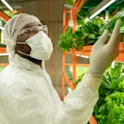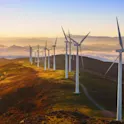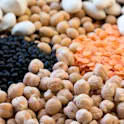1,071 news posts

Research Topics
28 May 2025
The fight to end hunger: Research Topics exploring food safety breakthroughs
These Research Topics explore how strengthening food safety can lay the groundwork for more resilient and equitable food systems.

Research Topics
29 Apr 2025
Exploring renewable energy: Research Topics powering a better future
Research Topics investigating renewable energy as a pathway to a more sustainable, resilient, and equitable future for all.

Research Topics
21 Mar 2025
Data without borders: three Research Topics unlocking shared knowledge for a shared future
Three Research Topics exploring the opportunities and challenges of sharing and leveraging today's data and technologies to tackle our planet's most pressing issues.

Featured news
06 Mar 2025
University of Kansas and Frontiers renew flat fee open access agreement for 2025
The University of Kansas (KU) and award-winning open science platform Frontiers are pleased to announce the renewal of their open-access publishing partnership for an additional year. Initially established in 2024, this agreement maintains its terms to provide KU researchers with seamless, cost-free access to publish in all Frontiers journals.

Research Topics
27 Feb 2025
Four Research Topics on turning science into action for a sustainable future
Four Research Topics showcasing solutions for a more sustainable world.

Featured news
26 Feb 2025
Frontiers and ZB MED mark second year of national agreement to strengthen open access publishing in Germany
Frontiers is pleased to announce the continuation of its partnership with the German National Library of Medicine (ZB MED) into a second year. Building on the successful collaboration established in 2024, this agreement reinforces our shared commitment to advancing open science by providing researchers across Germany with seamless, cost-effective access to gold open access publishing.

Featured news
10 Feb 2025
Sikt renews National open access agreement with Frontiers for 2025
Frontiers has renewed its national open access agreement with Norway for 2025, reinforcing a shared commitment to advancing open science. Originally signed in 2020, this agreement - facilitated by the Norwegian Agency for Shared Services in Education and Research (Sikt) - streamlines the publishing process for Norwegian researchers and strengthens the country’s leadership in open access publishing.

Featured news
04 Feb 2025
Manchester Metropolitan University partners with Frontiers for new flat fee publishing agreement
Frontiers is pleased to announce a new three-year flat fee agreement with Manchester Metropolitan University (Man Met) starting in 2025. This agreement allows Man Met to provide its researchers with unlimited publishing opportunities in all Frontiers journals, free from individual article processing charges (APCs).

Research Topics
14 Jan 2025
A look at 2024’s most viewed Research Topics
An overview of our most popular Research Topics from last year.

Research Topics
29 Nov 2024
HIV/AIDS: Three Research Topics exploring latest discoveries, treatments, and prevention
Three Research Topics focused on HIV, sexually transmitted infections (STIs), and related issues.

Research Topics
19 Nov 2024
Shaping the future: must-read Research Topic on children’s issues
Research Topics exploring issues like the impact of parental mental health on kids, the effects of solitude in infancy, and patterns of internet use among children and adolescents.

eBooks
31 Oct 2024
Frontiers ebook releases: October 2024
Download the top ebook releases from this month. All ebooks are free to download, share, and distribute.

Research Topics
31 Oct 2024
Time to grow a mustache: five Research Topics exploring men-related issues
Research Topics on men's reproductive health, advancements in prostate cancer detection and treatment, and more.

Research Topics
18 Oct 2024
Open Access Week: three Research Topics fueling solutions for complex global challenges
During Open Access Week, we highlight the work of researchers who break down silos and share knowledge openly.

Research Topics
02 Oct 2024
Breast cancer breakthroughs: five Research Topics advancing early detection and treatment
Research Topics advancing breast cancer solutions.